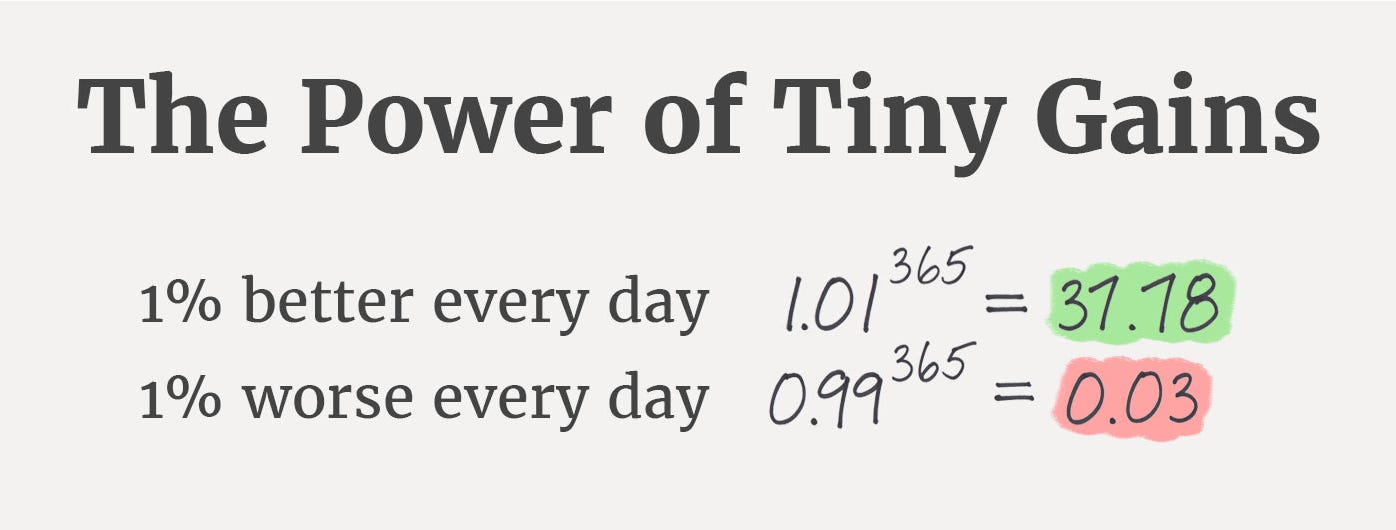Let's discuss why tiny improvements, aka Kaizen1, might be holding you back.
Enter Kaizen, the Japanese concept of continuous tiny improvements.
It's the soothing whisper of "just 1% better every day," promising that if you just tweak your processes enough, you'll wake up 37 times better in a year.
For an aspiring writer itching to break free from the 9-to-5 grind, it's more intoxicating than the break room's fancy new table tennis.
And sure, "getting one percent better isn't going to make headlines," as James Clear says. But you know what else doesn't make headlines? The thousands of aspiring Substack writers who never move past their welcome post because they're too busy trying to perfect their writing process.
Let's look at how this Kaizen mindset might play out for you:
Week One: Optimize your writing environment.
Week Two: Implement a strict writing schedule.
Week Three: A/B test your headlines.
Sound familiar? On the surface, it seems reasonable. Who doesn't want to be a more efficient writer?
In "The Compound Effect," Darren Hardy explains how small, everyday decisions can lead to significant results over time. While that's true, the problem isn't that Kaizen doesn't work. It's that it works too well at keeping you in your comfort zone.
The problem isn't that Kaizen doesn't work. It's that it works too well at keeping you in your comfort zone.
It's far easier to obsess over the perfect writing routine than to face the terrifying prospect of actually putting your words out into the world.
Remember the British cycling team that used Kaizen to dominate the Olympics? They broke down every element of cycling and improved each by 1%.
But here's the thing - you're not trying to win a gold medal in corporate report writing.
Your future Substack subscribers don't care about your perfectly optimised writing process. They care about your ideas, your perspective, your willingness to be human and vulnerable on the page. They want the messy, complicated you.
Jeff Olson's "The Slight Edge" emphasises that simple daily disciplines can lead to success and fulfilment. Yet, what if, instead of asking, "What one small improvement can I make to my writing this week?" you asked, "What would I write if I weren't afraid of imperfection?" What if, instead of constantly striving to be a better writer, you allowed yourself to be a real writer?
In "Tiny Habits," BJ Fogg suggests that even the smallest actions can create life-changing habits. But perhaps it's time to flip the script. Instead of making tiny tweaks, take a bold step. Hit "publish" on that imperfect post. Share the story that scares you.
It's a terrifying thought. Hitting "publish" on that first real post, knowing it's not perfect.
So, maybe it's time to let go of the Kaizen. Stop optimising. Start writing.





The first time I heard of the Kaizen technique and already looking forward to implementing it in my routine. People often think of big improvements, but it's the little ones that make the big differences. Thank you for sharing :)
So interesting! I like the idea of incremental improvements but you're probably right that - just as pulling off a sticking plaster bit by bit might feel easier but isn't the actually the most painless option - in work/writing life a bigger, bolder approach probably does achieve more.
Before your post I only knew of Kaizen from this band... https://www.youtube.com/watch?v=pcmT2Ma5Ado